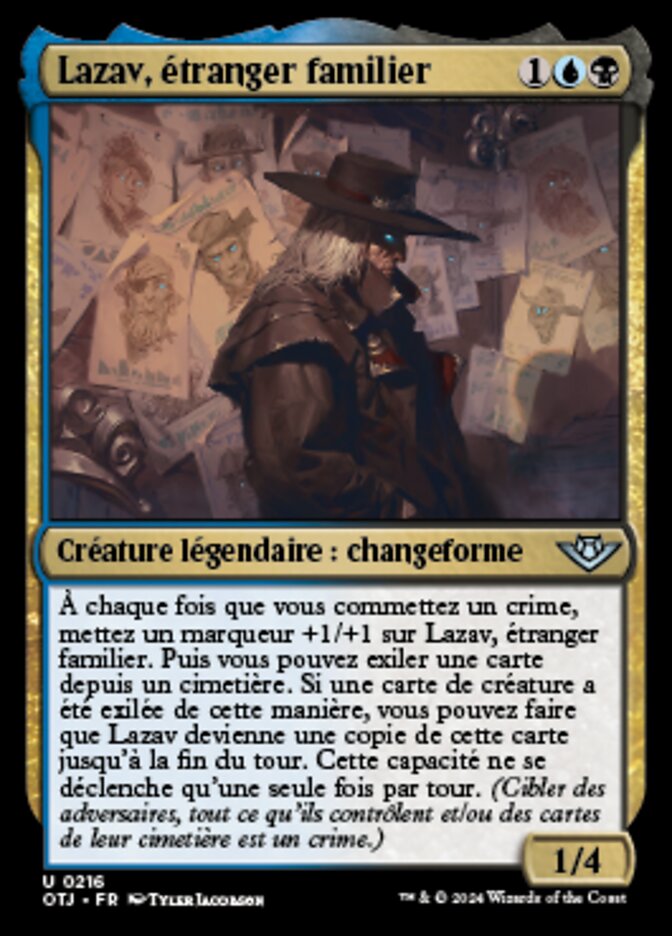
Lazav, étranger familier {1}{U}{B}
Créature légendaire — changeforme
À chaque fois que vous commettez un crime, mettez un marqueur +1/+1 sur Lazav, étranger familier. Puis vous pouvez exiler une carte depuis un cimetière. Si une carte de créature a été exilée de cette manière, vous pouvez faire que Lazav devienne une copie de cette carte jusqu'à la fin du tour. Cette capacité ne se déclenche qu'une seule fois par tour. (Cibler des adversaires, tout ce qu'ils contrôlent et/ou des cartes de leur cimetière est un crime.)
1/4
Illustrated by Tyler Jacobson
- Standard
- Legal
- Alchemy
- Legal
- Pioneer
- Legal
- Explorer
- Legal
- Modern
- Legal
- Historic
- Legal
- Legacy
- Legal
- Brawl
- Legal
- Vintage
- Legal
- Timeless
- Legal
- Commander
- Legal
- Pauper
- Not Legal
- Oathbreaker
- Legal
- Penny
- Legal
Toolbox
Buy This Card
Notes and Rules Information for Lazav, étranger familier:
- Only the English version of a Magic card receives Oracle updates and errata. View this card in English. (Scryfall note)
- Lazav copies exactly what was printed on the original card and nothing else. It doesn’t copy any information about the object the card was before it was put into a graveyard. (2024-04-12)
- Any effects that applied to Lazav before it becomes a copy of another card will continue to apply once it becomes a copy. The same is true of any counters that are on Lazav. (2024-04-12)
- When Lazav becomes a copy of an exiled creature card, it’s neither entering nor leaving the battlefield. Any enters-the-battlefield or leaves-the-battlefield abilities won’t trigger. (2024-04-12)
- A player commits a crime as they cast a spell, activate an ability, or put a triggered ability on the stack that targets at least one opponent, at least one permanent, spell, or ability an opponent controls, and/or at least one card in an opponent’s graveyard. (2024-04-12)
- The spell or ability that constituted a crime doesn’t have to have resolved yet or at all. As soon as you’re finished casting the spell, activating the ability, or putting the triggered ability on the stack, you’ve committed a crime. (2024-04-12)
- For example, an ability that triggers when you cast a spell that targets an opponent will trigger at the same time as an ability that triggers whenever you commit a crime. Those abilities can be put on the stack in either order (if you control them both), and they’ll both resolve before the spell that caused them to trigger. (2024-04-12)
- A player can commit only one crime per spell or ability they control. Targeting multiple opponents, permanents, spells, abilities, and/or cards with the same spell or ability doesn’t constitute committing multiple crimes. (2024-04-12)
- Changing the target or targets of a spell or ability won’t affect whether or not the controller of that spell or ability has committed a crime. Only the initial targets chosen for that spell or ability are used to determine whether or not its controller committed a crime. (2024-04-12)